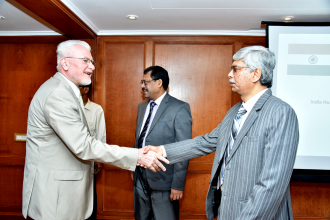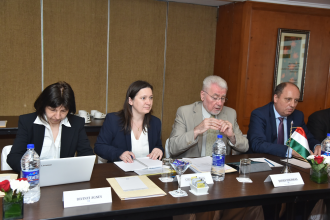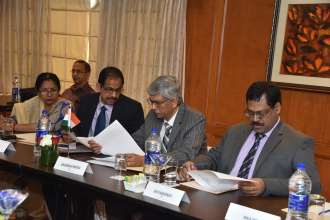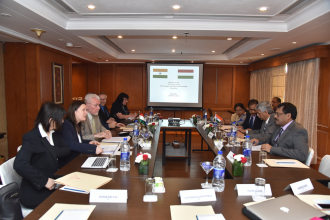ELI workshop
In his welcome speech, József Pálinkás highlighted that ELI-ALPS offers word-class infrastructure for laser technology. Successful bilateral scientific and technology (S&T) relations between Hungary and India form a solid basis for continued cooperation in ELI-ALPS projects. The ELI-ALPS Research Institute in Szeged was built from HUF 80 billion, financed partly from the EU Structural Funds and partly from domestic funds, and will become an important centre for research using short light pulses – the President of the NRDI Office pointed out. The facility is already open to researcher communities in all parts of the world not only for research in physics, but also in fields such as biology, chemistry, medicine and materials sciences.
Dr. Arun Srivastava, secretary of the Indian Atomic Energy Commission said that India is committed to cooperation with Europe in infrastructure usage. He added that they will consider how Indian researchers could join ELI cooperation programmes and will also identify potential Indian partner institutions. As a clear sign of the readiness of the Indian researcher community to cooperate, Indian researchers presented several research topics and projects relevant to the ELI infrastructure at the meeting.
Dr. Zsolt Fülöp, envoy extraordinary and minister plenipotentiary for the international coordination of the ELI consortium summarised the EU framework of the ELI research infrastructure established in three countries (Hungary, the Czech Republic and Romania). He emphasised that the current pilot stage offers more flexible conditions for Indian researchers (nine of whom are already working in the ELI-ALPS Research Institute) to use the laser equipment, similarly to the Swiss and Israeli research groups working there since February. Lóránt Lehner, managing director of ELI-HU Nonprofit Ltd. presented the organisational structure and the construction of ELI-ALPS, then scientific director Károly Osvay outlined currently running experiments.
Hungarian–Indian Joint Committee of Science and Technology
At the bilateral meeting with the representatives of the State Secretariat for Science and Technology of the Ministry of Science and Technology of India, director Arabinda Mitra and József Pálinkás signed a document renewing the agreement between Hungary and India on the Strategic Research Fund which will provide the framework of financing joint funding programmes. Both parties to the meeting acknowledged the results of Hungarian–Indian S&T cooperation, which enabled seven projects from altogether 48 submitted project proposals to get funding from the EUR 1.2–1.2 million budgets earmarked by Hungary and India for this purpose.
Global Development Network (GDN) conference
The Global Development Network held its 18th annual conference with more than 200 participants on 22–23 March 2018 in New Delhi. The conference addressed the question of how the results of research, development and innovation could be used to facilitate the development of emerging countries. In the panel discussion “The goal of sustainable development in science, technology and innovation” József Pálinkás pointed out that economic, political, technological, social and environmental aspects should all be considered to achieve the sustainability goals. He called attention to the disparities caused by new technologies, underlining that RDI in itself will not solve the problems of emerging countries. At the conference József Pálinkás held talks with Pierre Jacquet, President of the GDN and François Bourguignon, who briefly introduced the mission and operation of the organisation.
 |
 |
 |
 |






